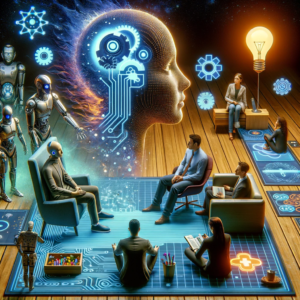In my opinion, the integration of AI in mental health care, particularly for anxiety disorders, offers significant potential. This view is supported by a detailed article from the National Center for Biotechnology Information (NCBI) which discusses various aspects of AI application in mental health care.
Key Insights from the NCBI Article:
- AI as a Beneficial Tool in Mental Healthcare: AI can suggest therapies or alert medical practitioners in critical situations, similar to smart glucose trackers in diabetes care. This indicates a promising role for AI in mental healthcare, potentially improving patient outcomes.
- Lack of Self-Awareness in Mental Health Issues: AI-based tools can increase awareness about mental health status. For example, apps tracking typing patterns or phone usage could detect early signs of mental illnesses, prompting users to seek professional help.
- Addressing Social Stigma: AI can provide mental health support discreetly, helping those hesitant to seek help due to social stigma. This could be particularly beneficial for conditions where patients are reluctant to interact with human therapists.
- Preference for Non-Human Interaction: In conditions like depression or autism, AI tools might be more approachable than human interaction. Studies have shown that virtual therapists can be effective, especially in cases like post-traumatic stress disorder.
- Resource Shortages in Mental Healthcare: AI can help mitigate the global shortage of mental health workers. AI-driven tools, accessible via smartphones or the internet, could provide basic care, supplementing the work of human therapists.
- Inefficiency in Traditional Mental Healthcare: AI has the potential to improve the efficiency of mental healthcare. For instance, machine learning can predict the effectiveness of treatments like deep-brain stimulation, offering more personalized care.
- Challenges and Ethical Considerations: The article also discusses potential drawbacks, such as false positives in digital phenotyping, which could burden healthcare systems. Ethical and philosophical implications of AI in mental healthcare are also highlighted.
My Perspective:
The use of AI in mental health care, especially for initial assessments and diagnosis of disorders like anxiety, depression, ADHD, and others, seems highly promising. AI-driven tools can enhance self-awareness, address social stigma, and offer an alternative for those uncomfortable with traditional face-to-face therapy. However, it’s crucial to balance AI use with professional human judgment. AI should be seen as a supplementary tool, not a replacement for comprehensive, empathetic care provided by human professionals.
The potential for AI to alleviate resource shortages and improve treatment efficiency is particularly compelling. However, the ethical implications and the need for nuanced human interpretation in mental health care cannot be overlooked. AI in mental healthcare should be developed and used thoughtfully, ensuring it complements rather than replaces the human element in mental health treatment.
For more detailed insights, you can read the full article on the NCBI website here.






